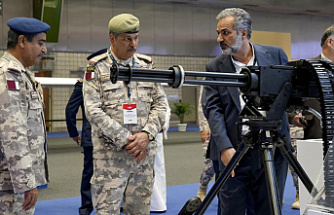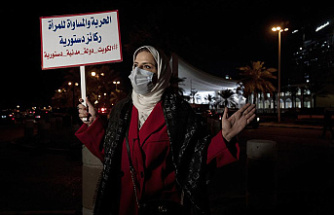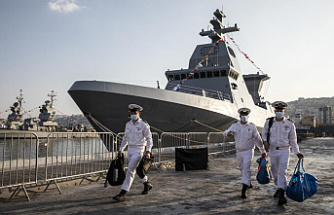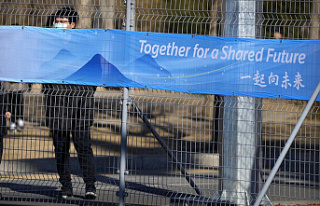Hamra Street was Beirut's center of glamour in the 1960s & 1970s. It was home to Lebanon's most prestigious movie houses and theaters. There were also cafes that were frequented daily by artists and intellectuals. Shops selling top international brands also occupied Hamra Street. The area has seen a revival in the last decade with many international chain stores, vibrant bars and restaurants.
Many of its shops are now closed. It is home to many homeless people, including Lebanese refugees and Lebanese. Its corners are littered with trash. The economic crash that swept through like a storm swept the streets of Lebanon.
Eid, 88, reminisces about the dark times during Lebanon's civil war 1975-1990. Hamra witnessed militias fighting, assassinations in its cafes, and even an invasion by Israeli troops marching down the street at one point. Eid claims that nothing was worse than now.
He said, "We have reached rock bottom." Tosca Music Shop & Electronic Supplies has few customers. They sell records and a range of electronic clocks, calculators, and watches. His business has declined 75%.
Lebanon's financial meltdown began in October 2019. It was the culmination the country's postwar era. They have held power since then, having been the war's militia leaders. Although the economy was sometimes booming, it was essentially a Ponzi scheme rife with corruption and mismanagement.
The World Bank called it one of the worst financial and economic crises the world has seen since the mid 1800s.
In a country that imports almost everything, the currency's value plummeted, wages lost their purchasing power, dollars in banks were no longer available, and prices soared. According to the U.N., 82% of the country's population lives in poverty.
The coronavirus pandemic, a huge explosion at Beirut's port that killed 216 people and injured thousands and decimated parts of the capital, exacerbated the crisis.
The political system has not collapsed despite the fact that the economic system was ruined. The same leaders, who are still in power, have done almost nothing to solve the crisis. They have refused to implement basic reforms and they have not made any progress in negotiations with the International Monetary Fund.
The impact of Hamra Street can be seen by taking a walk.
Many shops closed because their owners couldn't afford the high rents or large monthly electricity bills. The shops that remain open close at nightfall. Electricity cuts have caused many streetlights to stop working. Hamra, which used be lively well into the night, now feels empty before midnight, even during the holiday season.
Hamra was a thriving street in the 1960s and 70s when the street was illuminated with colored lights for Christmas and New Years. Santa Clauses would walk the streets offering candy to passersby.
This was Lebanon's pre-war cosmopolitan era. Hamra Street was the elegant heart of Beirut's Champs Élysees. American, European, and Arab tourists visited its chic shops, restaurants, and bars.
Hamra was home to the capital's most prestigious movie houses. Fayrouz, Lebanon's most loved singer, performed at the Piccadilly Theater. The international diva Dalida might be seen walking down the avenue in front of one her shows at Piccadilly. There were many world stars who performed in Lebanon, including Paul Anka and Louis Armstrong.
Hamra is located in the capital's western neighbourhood of Ras Beirut. It was and remains a place where Christians live side-by-side. Its cafes were a hangout for artists, intellectuals, and political activists caught up in the secular, leftist Arab nationalist spirit.
Mohamad Rayes says Hamra Street "is an international avenue." He has been working on the street since the early 1970s and currently owns three lingerie and clothes shops in the area.
He spoke from a cafe, which was known as the Horse Shoe in the 1970s. He pointed out a corner where Abdel-Halim Hafez, Farid el-Atrash and Farid el-Atrash were both regulars.
It was quite dizzying to see the sheer number of people living on Hamra. It was a vibrant, temporary piece of city life," David Livingston, an American who has lived in Lebanon for many decades, said from Cedar Rapids in Iowa. He was a student in Beirut in 1970s and recalled how intimidated it felt to go into Hamra Street to purchase a leather belt.
This golden age was ended by the civil war. Invading Israeli troops invaded Hamra in 1982. Militias took control of the area after they left and caused severe damage. The Commodore Hotel in Hamra became a popular place for foreign journalists covering this conflict.
The center of Beirut's international commerce moved to a new downtown after the war. Hamra Street was given a major makeover in 2000, when new water, electricity, and sewage systems were installed. The asphalt was also replaced by cobblestones.
This has fueled a revival over the past 15 years. Starbucks and Nike were opened by international chains. There were many new restaurants. Syrians fleding civil war in their country opened their own restaurants, as well as sweets shops and popular Shawarma stands.
Many of Hamra's prewar icons were swept aside by the new wave. The bank replaced Modca, the famous cafe. Faisal Restaurant was once home to Arab leftists who gathered there for cigarettes, arak liquor, and appetizers. Piccadilly Theater was closed and was recently destroyed by fire.
The street attracted young people from all religions and brought the progressive spirit of the 2011 Arab Spring. The street was filled with bars once again. Metro Medina was a club that attracted young people with its retro live shows featuring old Arabic music from the last century.
Hamra is still a bustling thoroughfare in the middle of the day. Many people visit Hamra to seek treatment at one of its medical centers, or to study at the American University of Beirut , which is one of the most prestigious educational institutions in the Middle East .
Elie Rbeiz said that Hamra isn't the Hamra from the past.
Rbeiz, 70 years old, has been a hairdresser in Hamra for the elite since 1962. Rbeiz counted Adnan Khashoggi as one of his regular clients. He once flew Rbeiz from Saudi Arabia to London in a private jet for a haircut. Rbeiz expanded his business to include men's clothing 20 years ago.
His sales have plummeted since the economic crisis.
Rbeiz still believes Hamra can bounce back. Rbeiz said that his shop was destroyed during civil war, and that he rebuilt it and reopened it. "I didn't surrender then, and I won't surrender now. Never."
However, not everyone can be so sure.
Naim Saleh said, "I feel the pain everyday because there is more suffering than poverty."
Saleh has been a fixture on Hamra Street for 52 years, selling magazines, newspapers and books at his sidewalk kiosk.
His business is now in ruins. Foreign magazines are expensive and not everyone can afford them. He now sells about a dozen books per month as opposed to the 50 he used to buy every day. Saleh watched a young beggar chasing Iraqi tourists nearby. "Look at how many street beggars you have. It's almost like a curse.
In 1958, Eid opened Hamra's music shop. He said that he will close the store when he is done working. His two sons, who live in the United States, don't need his 4,500 records. Many of them are collectors' pieces. He'll donate them all to the Lebanese National Higher Conservatory of Music.
Will Hamra Street flourish again? "Never, never. He said, "It's impossible." They'll be moving to Europe, not the Gulf tourists that once fuelled its commerce.
He won't go.
He said, "Hamra Street's the oxygen I breathe." "I grew-up on Hamra Street, and I will end my life there."











